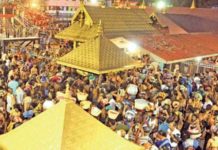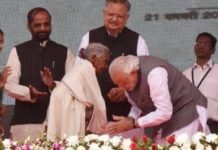We have seen many instances of popular people’s uprisings, where the common man stands up and fights off the corrupt state, but in Chhattisgarh there emerged a militia of the common people with the aim of countering the rampant violence by the Maoists in the state. The Maoists were quite popular in the tribal areas of Chhattisgarh but when the instances of Maoist violence started increasing, the tribal’s formed a group called ‘’Salwa Judum” which means a peace march in the local Gondi language. Salwa Judum was started in June 2005 in Dante Wada and Bastar districts of Chhattisgarh. Dante Wada and Bastar were traditionally sparsely populated but rich in natural resources, these had been the Maoist strongholds for more than two decades. The predominantly backward and uneducated regions were easy targets for the Maoists and they were easily able to establish a very commanding presence in these regions. Another hugely accepted theory is that Salwa Judum was always a planned government venture and that there is nothing spontaneous about its origin. The movement got large amounts of state aid and even had the backing of the union government. The reasons for this maybe the fact that the Chhattisgarh government had signed MoU’s with the Tata and Essar groups and was eager to flush the Maoists out of the areas of immense natural wealth.
The leader of the movement was the senior congress leader Mahendra Karma, a former MLA who was also at the forefront of the 1991 Jan Jagran Abhyian. The method of this anti Maoist movement was to threaten the villages to hand over the people who were in any way attached to or sympathetic to the Maoist or face attacks by the group which involved burning of houses, looting and plundering. Mahendra Karma was also the state congress leader when the Salwa Judum movement started. It was he who took the lead in organizing rallies for the movement and mobilized the local tribal people against the Maoist. What initially started as a peoples’ resistance movement later became a completely government funded and largely state run organization. The chief minister and other ministers of the state started attending Salwa Judum rallies and gave speeches to inspire the crowd before they went into combat against the Maoists. The state trained the adivasis and armed them with sophisticated guns. A group called Special Police Officers (SPOs) came into being. These officers fought the Maoists and performed the duties as any other police officers but they were paid only a meager monthly allowance and even this payment was not regular. Villages were forced to join the Salwa Judum movement and were taken to camps and trained there. A village got Rs 2Lakhs for joining Salwa Judum. People were coerced into joining the movement and were harmed and looted if they disagreed. The Salwa Judum not only got monetary support from the state but also got the support of the all powerful state police and the central reserve police force (CRPF). The national highway check points were now manned by the Salwa Judum activists rather than the highway police.
THE SALWA JUDUM CAMPS
The camps were mostly located in proximity of a police station as it gave a safeguard against Maoist attacks. These Salwa Judum camps housed the village sarpanch and their families and allies. It also housed the people who fled their houses because of a real incident or because of rumors of Maoist violence. The camps were home to the Special Police Officers and also to the surrendered Sangham (villagers aiding the Maoists) members. In Dante Wada alone there are 17 such camps with a total of 15, 000 people in them. The people in the camps lived in little shacks made of plastic sheets and sticks and the sanitation conditions were quite bad. The villagers had to move large distances from their camps to go to their farmlands to work. What bound the people in the camps was their anxiety regarding their going back home. Many people in the camps would alternate between the fear of violence from the Salwa Judum workers and the violence of the Maoists.
THE EFFECTS OF SALWA JUDUM
The Salwa Judum was initially successful in achieving its target of reducing the Maoist influence in Dante Wada and Bastar but it had its fair share of drawbacks and serious procedural loopholes. The SPOs were just village commoners who were put into combat after hardly any training and many of them were killed because of being technically inferior to the Maoists. They never had the motive to fight and win because their work was not recognized and they were paid very little money. The Salwa Judum movement created a situation which was like a war between the state backed SPOs and other activists against their own people, the Maoists. In this civil war-like situation the worst sufferers were the tribals and local people who were pulled into the fight between both the sides. They had to face instances of violence from both the sides, their employment opportunities were drastically reduced because of the breakdown of civil machinery in the state. The state had awarded the contract to build the new National Highway16 to the Border Road Organization so workers came from other states and the local people were denied the opportunity to earn a living. The people lived in abject poverty and feared every single day of their lives. The worst part was that the Salwa Judum movement was state backed so even the atrocities and killings done by the activists were not registered. This way the Salwa Judum violence was worse than the Maoists’ as it had no remedy available. The total killings by the Salwa Judum activists were estimated to be around 100 and more than 30000 people were displaced from their homes. Apart from that, there were many allegations of looting and rape against the activists. The security forces which ideally should have been preventing the conflicts and instances of violence joined the movement and did nothing to control the situation.
THE SUPREME COURT VERDICT ON SALWA JUDUM AND ITS SIGNIFICANCE
The Supreme Court, in the case of Nandini Sundar and ors. v. State of Chhattisgarh, dated 7th July 2011, held that the appointment of the SPOs involved in the Salwa Judum movement in the state of Chhattisgarh and arming them is unconstitutional. This judgment of the Supreme Court is of grave importance and it shows the power of the judiciary as it quashes a movement which was backed strongly by the state government and the union.
The court pointed out the state government’s ‘Culture of unrestrained selfishness and greed spared by modern neo-liberal economic ideology’ which delineates the economic motive of the Chhattisgarh government and its relation with the emergence and arming of the SPOs. The point at issue in this case basically is, can a state create an army of civilians and then arm them and engage them in counter insurgency operations? The Chhattisgarh state took the defense that the civilians were given fire arms only for their self defense but the petitioners side of the case was that the policy of arming civilians lacked any legal backing and led to gross violations of Human rights. The SPOs were casually armed and trained and they engaged in unrestricted acts of violence. Moreover the SPOs were not trained enough to understand the instances of self defense. Thus, the state government’s claim was baseless. The state also took the defense that it was the villagers’ own choice to join the movement and that it was providing employment to the people. The Supreme Court held that engaging civilians in warfare without proper training can never be justified as an employment generation measure.
The court said that the Salwa Judum movement of the state of Chhattisgarh was violative of Article 14 and Article 21of the Constitution of India. The state of Chhattisgarh was asked to immediately cease and desist from using Salwa Judum in any manner or form and it also directed the Union to stop providing funds for the movement. This Supreme Court judgment is of immense significance as it upholds the spirit of the Constitution and acts as an effective check to the blatant abuse of power and violation of human rights.
Mohammed Omer Farooq
Batch of 2016
NALSAR University of Law















Thank you so much for making me aware of what ‘Salwa Judum’ was all about and also the SC verdict on Salwa Judum.
After reading this article, I cannot help but wonder, of how a movement started by the condemned tribals against Maoist violence turned into such a violent “uprising” that it became more of a threat to innocent lives than the Maoist violence!
And, also, how did such an act of totalitarianism by the State, was being turned a blind eye to, by the Union Government.
“This judgment of the Supreme Court is of grave importance and it shows the power of the judiciary as it quashes a movement which was backed strongly by the state government and the union.” Indeed.
Glad i could help:)
Everyone should read Javed Iqbal on the Salwa Judum judgment. (http://english.aljazeera.net/indepth/opinion/2011/07/2011710144637637841.html)
thhe article posted above is actually very helpful to kick away all the misconcepions and confusion regarding salwa judum:and the al-jazeera article is a wel opionated survey into its depth, and nw we understand better…THANK U!!
Thank you, Aymen. 🙂
After getting to know what ‘Salwa Judum’ is all about and reading this ‘Al Jazeera’ article, I’d only like to quote SC, when it questioned, publicly, the Central Government’s inertia on the issue of ‘Black Money being stashed abroad’ , “What the hell is going on in this country?” :I
nice!!!
yeh omer bhai cha gaye!!!!1111
very well written and indeed very helpful.thanks!!
nice article guys…..can u all plz post a similar simple artical on Greece Financial Crisis…being an science student, its difficult fr me to understand the issue clearly..!!!! 🙂
Not just Greece, but Europe, entirely is facing a financial crisis.
Actually. Please get an article done, guys! 🙂
P.S. – ITC shall never face financial crisis. They are having dedicated customers these days. 😛
well written….. !!
I could visualize the work done by U, Omer dear. It’s splendid and I sensed ur spirit in making up the content of essay.
As comprehensive as ever. 🙂
very knowledgeable article . I did not know about the matter because these days I’m not reading The hindu because of some reasons, but this article is so easily explained that I’m now well versed with the matter. Thanks a lot. Nice work.
Thnxxxxx u omerr sirrr!!!!!! Vryyyyy infrmative nd niceeeeeeeeee!!!!! U r a true inspiration 4 meeee dearrr!!!!!!!!!!! Thnxxxx u 1nce agn. :):):):):):):):):)